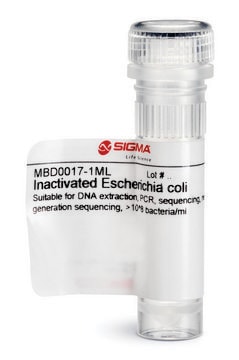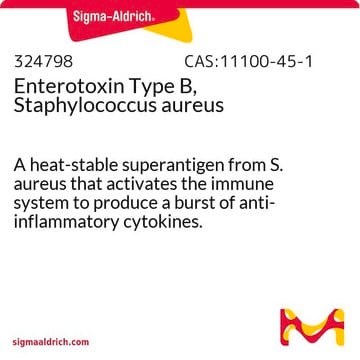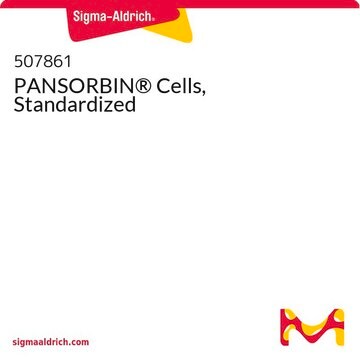S2014
Staphylococcus aureus
buffered aqueous suspension, Wood 46 strain
Iniciar sesiónpara Ver la Fijación de precios por contrato y de la organización
About This Item
UNSPSC Code:
12352202
NACRES:
NA.81
Productos recomendados
biological source
Staphylococcus aureus
Quality Level
sterility
Not processed or packaged aseptically
form
buffered aqueous suspension
composition
Cell suspension, ~10% wet weight/volume
storage temp.
2-8°C
General description
Staphylococcus aureus Wood 46 is protein A deficient and spa negative. It shares 98% to 99% genome identity with S.aureus and shows a lower surface expression of cell wall-associated protein A.
Application
(Not intended for use as a starter culture.)
Staphylococcus aureus has been used:
- to mimic infection and induce fever in Pekin duck
- to test its effect on hemocyte morphology in hemolymph samples from beetle Tenebrio molitor larva
- in the antibacterial activity and minimum inhibitory concentration (MIC) assay with gedunin and 7-deacetoxy-7αhydroxygedunin potassium salt
Wood 46, a non-protein A producing S. aureus strain, prepared by the same method as P7155 (Protein A, crude cell suspension-Cowan strain), may be used as a control in protein A-immunoglobulin binding studies.
Biochem/physiol Actions
Staphylococcus aureus Wood 46 displays reduced virulence compared to the S. aureus. This isolate is useful in understanding protein A role in pathogenesis and virulence.
Physical form
Formalin-fixed crude cell suspension of essentially non-viable S. aureus (Wood 46 strain) in 0.05 M potassium phosphate buffer, pH 7.5, containing 0.2% sodium azide
Preparation Note
Produced in pure culture.
Analysis Note
This strain binds less than 10% of the rabbit IgG bound by P 7155 as assayed by a modification of the method of Kessler.
Storage Class
10 - Combustible liquids
wgk_germany
WGK 3
flash_point_f
Not applicable
flash_point_c
Not applicable
Certificados de análisis (COA)
Busque Certificados de análisis (COA) introduciendo el número de lote del producto. Los números de lote se encuentran en la etiqueta del producto después de las palabras «Lot» o «Batch»
¿Ya tiene este producto?
Encuentre la documentación para los productos que ha comprado recientemente en la Biblioteca de documentos.
Los clientes también vieron
Manasi Balachandran et al.
Genome announcements, 5(13) (2017-04-01)
Here, we report the first complete genome sequence of the Staphylococcus aureus strain Wood 46. Wood 46 has played an important role in understanding the virulence and pathogenesis of S. aureus infections. This report will assist efforts in vaccine development against
Arkadiusz Urbański et al.
Scientific reports, 12(1), 17277-17277 (2022-10-15)
Tachykinins (TKs) are a group of conserved neuropeptides. In insects, tachykinin-related peptides (TRPs) are important modulators of several functions such as nociception and lipid metabolism. Recently, it has become clear that TRPs also play a role in regulating the insect
M Marais et al.
Poultry science, 90(6), 1234-1238 (2011-05-21)
Poultry, like mammals and other birds, develop fever when exposed to compounds from gram-negative bacteria. Mammals also develop fever when exposed to the constituents of viruses or gram-positive bacteria, and the fevers stimulated by these different pathogenic classes have discrete
G Kronvall et al.
Infection and immunity, 3(1), 10-15 (1971-01-01)
Protein A of Staphylococcus aureus can be detected on cell walls of intact bacteria by use of radioactively labeled myeloma globulin. Of 156 strains of S. aureus, 141 (90%) contained protein A. None of 47 S. epidermidis strains was positive
Manasi Balachandran et al.
PloS one, 12(8), e0183913-e0183913 (2017-09-01)
Protein A in Staphylococcus aureus is encoded by the spa (staphylococcal protein A) gene and binds to immunoglobulin (Ig). The S. aureus strain Wood 46 has been variously reported as protein A-deficient and/or spa negative and used as a control
Nuestro equipo de científicos tiene experiencia en todas las áreas de investigación: Ciencias de la vida, Ciencia de los materiales, Síntesis química, Cromatografía, Analítica y muchas otras.
Póngase en contacto con el Servicio técnico








